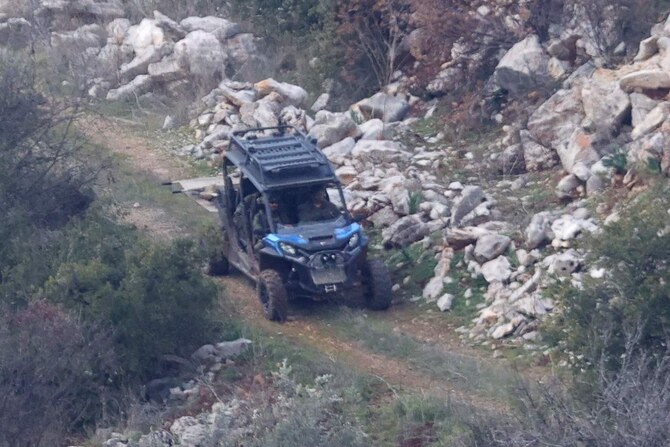BEIRUT: Lebanon’s president on Monday voiced concern that Israel may fail to withdraw its forces from the country by the Tuesday ceasefire deadline.
Joseph Aoun’s comments followed an Israeli drone strike in south Lebanon that killed a Hamas commander and pledges from some Israeli officials to keep troops in 5 strategic positions across south Lebanon.
The president is “following up on contacts at various levels to push Israel to abide by the ceasefire agreement, withdraw on the specified date and return the hostages,” his office said.
He called on the brokers of the Hezbollah-Israel ceasefire to “fulfill their responsibilities and assist us.”
During his meeting with the head of the UNIFIL mission, Maj. Gen. Aroldo Lazaro, Aoun renewed his condemnation of last week’s attack on a peacekeeping convoy.
He reiterated his support for investigations into the incident.
Egyptian Ambassador to Lebanon Alaa Moussa joined Aoun in a meeting of the envoys of the five countries monitoring Lebanese developments.
Moussa confirmed the commitment of the five countries to push Israel to withdraw on the scheduled date.
He said that the quintet is communicating with all parties to achieve the withdrawal.
Lebanon has not received any assurances confirming that it will be completed on time, presidential spokesperson Najat Charafeddine said.
Israeli troops have been stationed in Lebanon’s southern border area since last October.
Israeli officials have said the army will maintain control over five strategic hills along the Lebanese border even after Feb. 18.
Several conflicting Israeli statements were issued regarding the complete withdrawal.
The Israeli Army Channel announced on Monday afternoon that Israel “will withdraw tomorrow from Lebanon, except five strategic positions, where it will remain indefinitely.”
Israeli Defense Minister Benny Gantz claimed that the Lebanese state “did not adhere to the ceasefire agreement, as Hezbollah is rearming itself,” adding: “The army should not be withdrawn from Lebanon.”
Citing an Israeli official, some Israeli media outlets said that troops “will withdraw on time,” while other outlets reported “direct threats to bomb Lebanon and Hezbollah’s strongholds anywhere.”
On Monday noon, Israel intensified its air and land ceasefire violations by targeting a Hamas leader in Saida.
More raids were also launched deep inside Lebanese territory on Sunday night.
Bulldozing operations and burning of facilities were carried out in several towns on Monday.
On Monday morning, an Israeli drone targeted a car on Sidon’s coastal road that was heading toward Beirut, killing its driver, later identified as Hamas military official Mohammed Shahin.
Shahin was head of Hamas’ operations directorate in Lebanon, said Israeli army spokesperson Avichay Adraee, adding that the operation was a joint effort between the Israeli army and Shin Bet.
Adraee said that Shanin was “an important and experienced Hamas operative, and was involved in carrying out various attacks during the war, including launching rockets at Israel’s home front.”
He had recently been working to promote plans “under Iranian direction and funding from Lebanese territory,” the spokesperson claimed.
The Israeli Broadcasting Corporation reported that Prime Minister Benjamin Netanyahu left his trial session to approve the assassination.
An Israeli drone dropped a grenade in the town square of Kfarchouba to intimidate residents who were monitoring an Israeli incursion into the center of the town despite the deployment of the Lebanese army on its outskirts.
Israeli forces also set fire to several homes in the town of Odaisseh and carried out an explosion in Yaroun.
Israeli jets conducted airstrikes on locations in northern Bekaa on Sunday evening, claiming that the sites were linked to Hezbollah.
The airstrikes coincided with a speech by Hezbollah Secretary-General Sheikh Naim Qassem in which he warned the Israeli army that Hezbollah would regard “the presence of the Israeli army at any location as an occupation.”
Qassem said: “There is no justification for Israel to refrain from withdrawal, nor to remain at five points or any other details.
“While we will not specify how to deal with the occupier, it is well understood by all how such situations are typically addressed.”
In a related development, Air France and Emirates Airlines announced the cancellation of their flights to Lebanon on Feb. 23.
The date coincides with the funeral of former Hezbollah secretary-general Hassan Nasrallah and his successor, Hashem Safieddine.


























